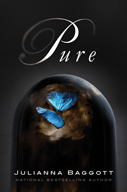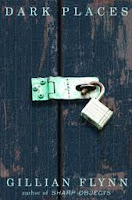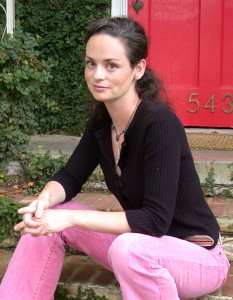A very happy publication day to Julianna Baggott and her immensely wonderful
Harriet Wolf's Seventh Book of Wonders. Baggott spent years getting this book right, she has explained in interviews. Her dad helped with research, her acknowledgments say. And anyone who has witnessed Baggott in social media knows her heart is always in the right place. Her mind, too.
My review in full is
here.
I read two very dark stories in the same week. They were different genres: dystopian YA versus contemporary mystery. Both featured damaged protagonists. One kept me glued to the page. The other found me skimming to see how it ended without engaging me along the way.

The first was Julianna Baggott’s Pure. The dystopian setting is depressingly bleak. It takes place in a post-apocalyptic world where people have been fused to objects. Her world-building through choice of details made the story interesting and kept me reading. I can’t say I enjoyed it. It was tragic all the way through with no happy moments. The third person omniscient narrator traveled between co-protagonists, Pressia and Partridge, at a remove. The verbal camera also encompassed secondary characters that never fully came to life. They served as pawns to move the story forward. I never really felt a connection to the main characters, though I felt sympathy for their plight. None of the information reveals about how the story world developed were surprising. The terrible choice the heroine made at the end was treated almost clinically. I didn’t sense the anguish she should have felt. The ending was left open for a sequel.
Writers interested in learning more about world-building and unique vision should read Pure.

The second book was Gillian Flynn’s Dark Places. Her rich, narrative voice made the story fascinating to read. The protagonist is a child damaged by the murder of her family (allegedly by her brother). She was sympathetic yet tragic. I could appreciate why she turned out the way she did: a thief, a liar, a user. The story’s theme about exploiting the murder of others is strong. Flynn addressed the way survivors are cast into the spotlight and quickly forgotten and the macabre people who fixate on murders. The question of whether her brother committed the murders or not kept me turning pages to get to the truth. Four credible suspects were presented. The verbal camera moved between brother Ben, via third-person close up, the mother Patty via third person close up, the protagonist Libby via first person. In the end, the mystery was solved. I didn’t like the alternative last minute fifth suspect. There is one weird deviation to his POV at the end which didn’t add anything for me.
Writers interested in captivating narrative voice and page-turning, effective information reveals should read Dark Places.
You can learn as much from what you disliked about books as what you loved about them. Read both.
Describe your latest book. Fuse is the second installment in the Pure Trilogy, which follows a group of characters in a post-apocalyptic, dystopian world. In the first novel, Pressia, a 16-year-old girl with a doll head fused to her fist, is surviving in this detonated, ash-choked world, and Partridge has survived inside of a protective [...]
“Well, if you like your warnings ahead of time, then I’d say watch out for weasels and the Banshee—the Lost Soul of the Lost and Found—and a lot of other Cursed Creatures. Hmmm, and let’s see…the mice come in waves. And if you hear hooves coming behind you, crouch down. It’s the Pooka, and it won’t be a good ride if he grabs you.”
—The Prince of Fenway Park
 In the early 90s, Julianna Baggott and I were classmates in the MFA Writing Program at the University of North Carolina at Greensboro, along with David Scott (whom Julianna would later marry) and a number of other fine poets and fiction writers. (To name a few: Rowan Jacobsen, author of that bee book I raved about; his future wife, the poet and illustrator Mary Elder; poet Elizabeth Leigh Hadaway; novelist Quinn Dalton; Pulitzer-Prize-winning poet Claudia Emerson; and acclaimed science fiction writer Kelly Link. We all got to study with the great Fred Chappell, making us some of the luckiest people on the planet.)
In the early 90s, Julianna Baggott and I were classmates in the MFA Writing Program at the University of North Carolina at Greensboro, along with David Scott (whom Julianna would later marry) and a number of other fine poets and fiction writers. (To name a few: Rowan Jacobsen, author of that bee book I raved about; his future wife, the poet and illustrator Mary Elder; poet Elizabeth Leigh Hadaway; novelist Quinn Dalton; Pulitzer-Prize-winning poet Claudia Emerson; and acclaimed science fiction writer Kelly Link. We all got to study with the great Fred Chappell, making us some of the luckiest people on the planet.)
I’m always excited to hear that one of my friends has a new book out—especially when it’s Julianna. She is a writer of tremendous talent: a poet whose keen-edged phrases can make my breath catch in my throat, a spinner of magical children’s tales, a novelist who writes with an intense and lyrical candor. She has a gift for drawing her characters with a terrible honesty suffused with tenderness and a kind of raw humor. Her people are real people, aching and vulnerable and brave.
It’s no surprise, then, that Julianna’s 2009 middle-grade novel, The Prince of Fenway Park, made this year’s Cybils shortlist for Middle Grade Fantasy and Science Fiction. Her latest novel, The Ever Breath, has just come out and I am champing at the bit for a copy. As N. E. Bode, she wrote the deliciously original The Anybodies, The Nobodies, and The Slippery Map. Her novels for adults include Girl Talk, The Miss America Family, The Madam, and (as Bridget Asher) The Pretend Wife and My Husband’s Sweethearts. She has published three collections of poetry: This Country of Mothers, Lizzie Borden in Love, and Compulsions of Silkworms and Bees. Julianna and Dave and their four children live in Florida, where Julianna is an associate professor in FSU’s creative writing program.
Because talking about writing with other writers is one of my favorite things to do, I asked Julianna if I could bombard her with questions for an interview here at Bonny Glen. She said yes, and here it is.
I am always wildly curious to know how other writers work. What’s your writing life like—the rhythm of your days and weeks, with writing and mothering and working and researching and all the rest of it?
I stay up late at night. My husband wakes up early in the morning. He’s a stay at home dad—the hardworking kind who’s really taken over all of it (grocery shopping, cooking, carpooling). So he does the morning rush, getting the oldest three off to school. I sleep in with the 2 year old. We have sitters who come and stay a couple of morning hours so Dave and I can both focus. We wrestle the calendar and the business side of writing and the creative side, too. When I’m stuck, I ramble to Dave and he blathers and eventually he blathers something that helps. I sometimes have teaching days—I teach





